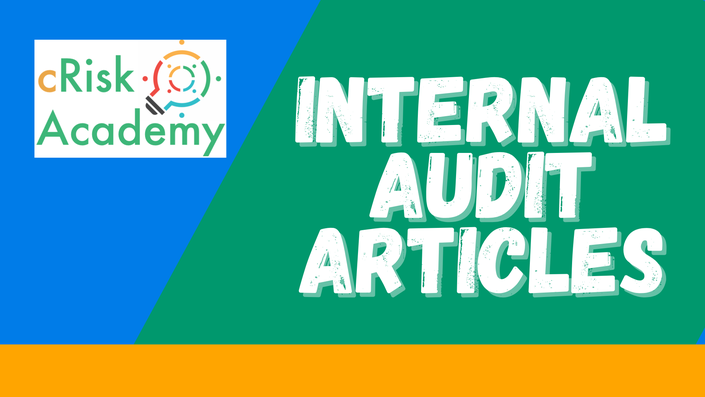
Why Audit Leaders Need Executive Coaching by Hal Garyn
Field: Auditing | Delivery Method: Self Study | CPE Hours: 0.25
Why Audit Leaders Need Executive Coaching
by Hal Garyn
“Coaching is not always about passing on what you know; it is about passing on who you are.” - Troy Urdahl, from “Chasing Influence”
While it may not be openly discussed, let me assure you that a high percentage of successful c-suite executives currently have, or have in the past had, access to executive coaching. As skilled as someone needs to be to rise to the level of competence, executive presence and political savvy that elevates them to the c-suite, everyone can improve. Everyone.And having someone, an executive coach, who is a dispassionate sounding board, and is there to support your success, but challenge you to improve, unemotionally but respectfully, is what everyone who aspires to the c-suite must have access to.
So, why is it that most Internal Audit Leaders (managers, directors, VPs, CAEs), with challenging “executive-level” responsibilities and accountabilities, do not avail themselves of executive coaching, except for a troubling caveat? Let’s explore this.
It Can Be, But Should Not Be, About Remediation
Candidly, some organizations treat executive coaching as a punishment or remediation. That’s the troubling caveat. The person who had so much promise, but had some (serious?) missteps, gets “assigned” an executive coach in these organizations. It’s akin to a “do this or you’re going to be fired” type of no-win scenario. Usually, but not always, in these organizations, this is the kiss of death. You accept the coach you are assigned, grin and bear it, and always question who the coach is loyal to … you or, much more likely, the organization that hired them “for you.” (Yes, the “for you” is in quotes because that’s not what it really feels like.)This feels like remediation, rather than real improvement. This is NOT the way to go. Yes, it could be a proverbial gift horse, and you can certainly leverage this opportunity for what it’s worth, but you’ve lost control in this situation. The organization has control.
And that’s not what you want if you want to steer your career with YOUR hands firmly on the wheel. Get assigned an executive coach by the organization after a counseling session … use it, leverage it, take advantage of it, but remember who the coach is working for … and it’s NOT you.
Let’s Face It, Internal Audit Leadership Can Be a Very Lonely Job
No matter how good we are at relationship building and trust me, you need to be good at it to do your internal audit leader’s role best, we still must be ultra careful with whom, and how, we confide in our challenges. And, as an Internal Audit Leader, there are countless challenges. Some of the myriad challenges you will certainly all nod in agreement with are:
- handling a tricky audit committee meeting/interaction,
- managing a staff of personalities who all need things from you,
- elevating a sensitive issue and navigating the associated politics,
- working though personality conflicts and power plays among second- and third-line assurance functions,
- avoiding getting into squabble with your administrative boss,
- and so on …
Many of these issues can easily be ones where confiding in an organizational peer or superior for confidential advice may not be prudent, given you don’t want to display any vulnerabilities, you may not have cultivated sufficient levels of trust and, candidly, these are some rather sensitive topics. Hence, internal audit leadership can be a lonely job.Talking with peers, if you have established a good, strong network of internal audit leaders at other organizations, is always a viable option. But there is also only so much you want to impose on your network.
This is where executive coaching is so unbelievably valuable.
What Should I Discuss With An Executive Coach
Quite frankly, discuss anything that is troubling you, challenges you are facing, areas you want to be sure you are exploring all options. While an executive coach may be a subject matter expert in internal auditing, they needn’t be. (But having an executive coach that understands the unique nature of internal audit leadership, in relation to other roles, is certainly a big plus).A good executive coach is a good listener, an insightful questioner, a person who knows how to use the Socratic method(1), and leads you to your own answers. They should not just be someone you take a problem to, and they just tell you the answer; they should be a guide to lead you to your own answers. Can that be frustrating at times? Sure. But they are trying to get you to think and act more like an executive, not be a font of subject matter expert answers.
When I have coached Internal Audit Leaders, some of the dilemmas I have helped guide people through have included:
- preparing for a particularly challenging Audit Committee meeting,
- responding to an organizational peer who is being somewhat belligerent and difficult to get along with,
- managing a co-sourcing relationship that is deteriorating,
- counseling a star employee who is being disruptive to team dynamics,
- making the case for increased budget and staffing ….
You get the idea.
You’ll know you’ve got a good executive coach if you are challenged to think more broadly and deeply, consider things you might not have thought of, and can quickly conclude that the person has only your best interests, growth, and development at heart.
Who Should Pay For Executive Coaching?
We are rather cheap as a profession when it comes to professional development. While there are exceptions, far too many of us will only do something that will help us professionally if our organization will pay for it.
Ask for permission, get denied, move on.
Or, we get approved, but only for a more inexpensive version of something we really wanted (and needed) to do.
We often forget that it is OUR professional development, which implies it is OUR responsibility, and that might mean paying for it out of our OWN pocket. But if it’s a sound investment in our future, then it is a good expense to personally incur. Having the burden of personally paying for something (rather than someone else) surely forces us to make sure we are getting true value from our investment. They call this “having skin in the game” and allows you to control the relationship.You may be wondering how much an executive coach costs, and where do I find one. While not always 100% true, the saying “you get what you pay for” typically applies. You probably should expect to pay somewhere between $150 and $500 per hour. You may talk with them, on average, for a couple of hours a month.
You can do the math from there. If a couple of thousand dollars a year gets you promoted faster, gets you raises quicker, makes you a more valuable executive team member, and makes you much more marketable … that’s a good return on investment, right? Right!
Finding an executive coach may seem a bit daunting. But ask around amongst your Internal Audit Leader colleagues at other organizations, ask an internal audit “thought leader” you know or want to get to know … in other words … network.
Don’t just google and see what you get. And make sure you get to know the executive coach you might be interested in before agreeing to any rates or terms. There must be a level of personal rapport between you and the coach if it is going to be successful. If a trial run seems like a “put your toe in the water” before making a major commitment, then find a potential coach who is willing to do that with you.
In Conclusion
It is highly unlikely that someone you admire and respect as a seasoned, experienced, and wise c-suite executive has never had an executive coach at some point in their career. In fact, almost all successful leaders have executive coaches.
If you want to be viewed by others as one of these executives during your career then, Internal Audit Leader, executive coaching may be what you need. And, if you want to have full control over who the coach is, and who the coach is loyal to, then you will want to be the one making the selection and the one paying for it.
Investments like this almost always pay big dividends over the long term.(1) The Socratic method uses a form of continual, progressive questioning to help guide someone to come up with an answer on their own that they may.
(1) The Socratic method uses a form of continual, progressive questioning to help guide someone to come up with an answer on their own that they may not have otherwise thought of.
To receive CPE for reading this article: "Enroll in Course for FREE" below.
Next Steps
When you are ready to start your executive coaching journey, reach out to Hal Garyn or Jason Mefford who can provide you with available options, and join your peers in the Audit Leader Forum™.
Join the Audit Leader Forum™ Basic Membership at: https://criskacademy.teachable.com/p/audit-leader-forum-basic
Join the Audit Leader Forum™ Premium Membership, which included one-on-one executive coaching, at: https://bit.ly/AuditLeader
© 2025 Hal Garyn, and published with author permission. The opinions expressed here are solely those of the author and do not represent the opinions of the cRisk Academy®.
Your Instructor

Jason Mefford is a rock star in internal audit, risk management and compliance. He typically works with Chief Audit Executives (CAE), Audit Committee (AC) members, and professionals in audit, risk and compliance with the technical and soft-skills needed to navigate the land mines of organizations. He takes complicated, confusing and hard things, makes them practical, proactive and simple to improve learning and transformation.
He's been a Chief Audit Executive, Chief Risk Officer, Chief Ethics and Compliance Officer, Chief Information Security Officer, Board Member, and has trained and consulted organizations all over the world. He is a thought leader in all things governance, risk and compliance (GRC) and internal audit, and is the recipient of multiple awards including:
- Rising Star in Corporate Governance from Yale University
- Rising Star in Corporate Governance Award (Finalist) from Corporate Secretary Magazine
- Thought Leader of the Year (Finalist) from The National Association of Experts, Writers & Speakers
- Fellow from the Open Compliance & Ethics Group (OCEG) Think Tank
You can learn more about him at: https://www.jasonmefford.com and join him in the Audit Leader Forum™ at: https://bit.ly/AuditLeader
